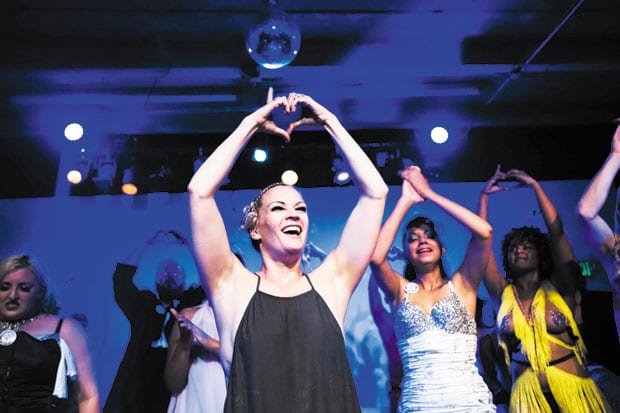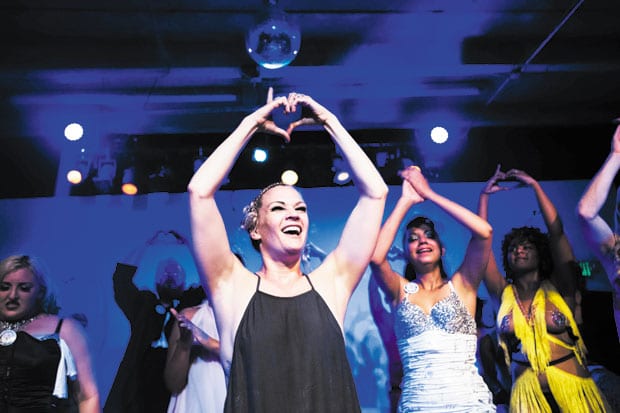Orlando performer inspires her community to keep on dancing after Pulse tragedy

Blue Star, known to the Orlando community as The Mother of Burlesque, is helping her city heal.
Dance can heal; we know that. It can be a cathartic soul-soother, as it’s been, ironically, in Orlando since the June 12 shooting at Pulse Nightclub that claimed 49 lives and injured 53 others, leaving the city, and the world, devastated and shaken and scared.
It can heal people like Blue Star who, at the age of 4, began ballet classes that fixed her “weird, turned-in legs.” And now it’s healing her once again, as a 42-year-old professional dancer who finds comfort in her art — the same art that brought light to the Orlando community when it needed it most.
“You look around,” says the out dancer, recalling the days after her space, The Venue, re-opened, “and everybody is just smiling and having a great time and they’re loving the song and they’re dancing and they’re dancing.”
In the hours and weeks after the tragic shooting, those in Orlando’s LGBT community kept moving, only stopping to make noble contributions. Water, gift cards, paper towels, food — you name it.
Blue, along with others in the community, organized the call for donations, putting together care packages for the victims, the victims’ families and Pulse employees, whom she calls her “family.”
“I always say that I’m the facilitator of fun, and I became a facilitator in another way,” says Blue, affectionately known to the community as the “Mother of Burlesque.”
She continued, “I had these volunteers show up, and it was amazing to watch that happen — my staff just pulling together. To be able to walk into a place that we established four years ago — you never know what you’re preparing for, but these last four years have really been preparation for what happened.”
Since 2012, Blue has been the brains behind The Venue, a rental and performance establishment — a “safe space” for people to come together in artistic unity, or even to celebrate the impending birth of a child. Located on Virginia Drive, just a few miles from Pulse, The Venue has hosted a variety of gatherings, from cabarets and burlesque shows to baby showers and bar mitzvahs.
But then the massacre happened, the deadliest mass shooting in modern American history, and suddenly Blue knew the community needed this space, which she says she “built with love,” even more.
Love abounded in the days following the massacre, and The Venue was full of overflow from The Center, Orlando’s pre-eminent LGBT community organization. “From sunrise to sunset,” Blue remembers, “it was this ongoing energy field of hugs and donations and coping.”
And healing.
When The Venue officially re-opened the following Friday with a burlesque show, Blue recalls the vibe being “gentle.”
“These four walls, that’s our imagination land,” she says, “and that’s where we get to get away from things. Unfortunately, that was taken away from [the Pulse victims].”
After Pulse, Blue’s movement-oriented hashtags — #ArtHeals, #BurlesqueHeals and #HealingOrlando — have helped mend the community’s wounds.
“She’s sort of grassroots, low-budget while simultaneously shining like a diamond in both dance and song,” says Billy Manes, editor of Watermark, Florida LGBT publication. “She’d just as soon play Donna Summer’s ‘On the Radio’ and lose her mind in the living room as she would kick a leg up, collapse and cry within the span of seconds on stage in front of hundreds. Blue Star is the real deal.
“She has changed this town for the better. She’s changed me for the better.”
For Blue, her compassion for her fellow Orlando friends and “family” is a no-brainer.
“You do what you’re supposed to do,” Blue says, simply, “and we are here to help one another and so I feel like it’s kind of just the way it goes.
This is what you need to do and you’re gonna do it. And then the next step comes and you’re gonna do that, too.”
Even before Pulse, Blue was offering hope in the midst of tragedy through other altruistic en-deavors. In 2014 she co-founded the Barber Fund, a grassroots organization established to assist men, women and children with cancer. The nonprofit is named in honor of Blue’s friend, the late John “Tweeka” Barber, who died of sinonasal carcinoma in 2011.
The Barber Fund’s “One Love” slogan, inspired by a David Guetta and Estelle song of the same name, “has been so important since 2011.” In recent months, following Pulse, “it’s everywhere,” she says.
“When [Barber] died, she gave her all to start the One Love Foundation to fund others who are dealing with the terrors of cancer,” Manes says.
“When the Pulse massacre happened, she danced this city through its pain, showing up where necessary and never showboating.
“Blue is a sort of pivotal bar of light in Orlando, an insurmountable force of nature in her compassion for others,” he continues. “You wouldn’t think a classically trained dancer with that smirk and wit would give a damn about anyone, but she gives all the damns.”
Chris Azzopardi is the editor of Q Syndicate, the international LGBT wire service. Reach him via his website at www.chris-azzopardi.com and on Twitter (@chrisazzopardi).
— Chris Azzopardi
This article appeared in the Dallas Voice print edition October 7, 2016.

